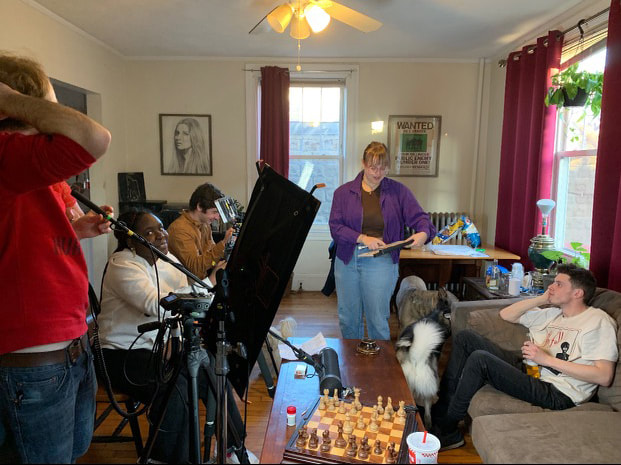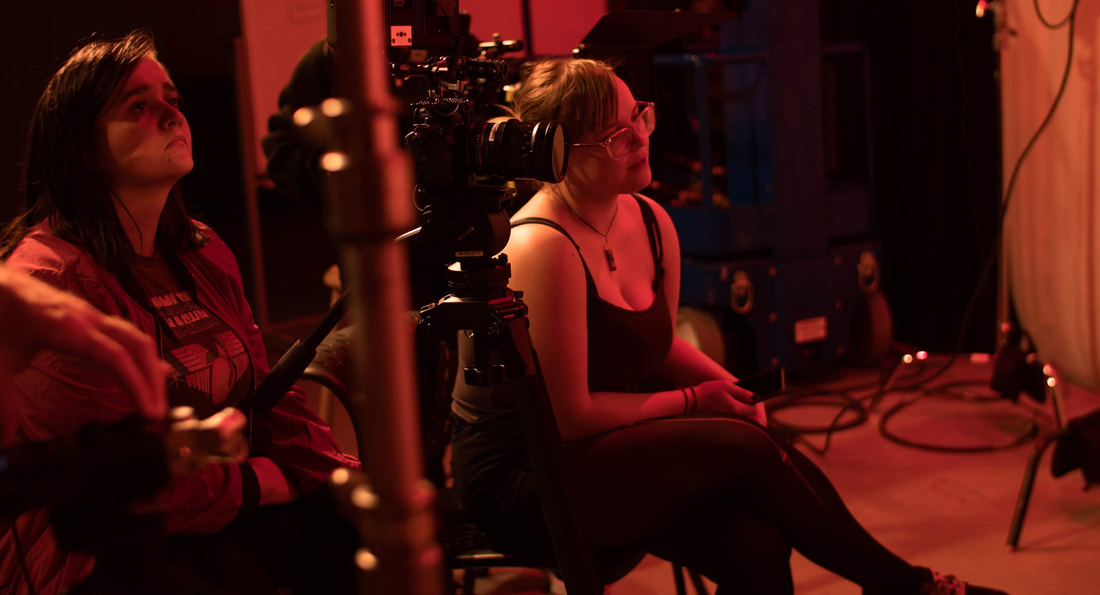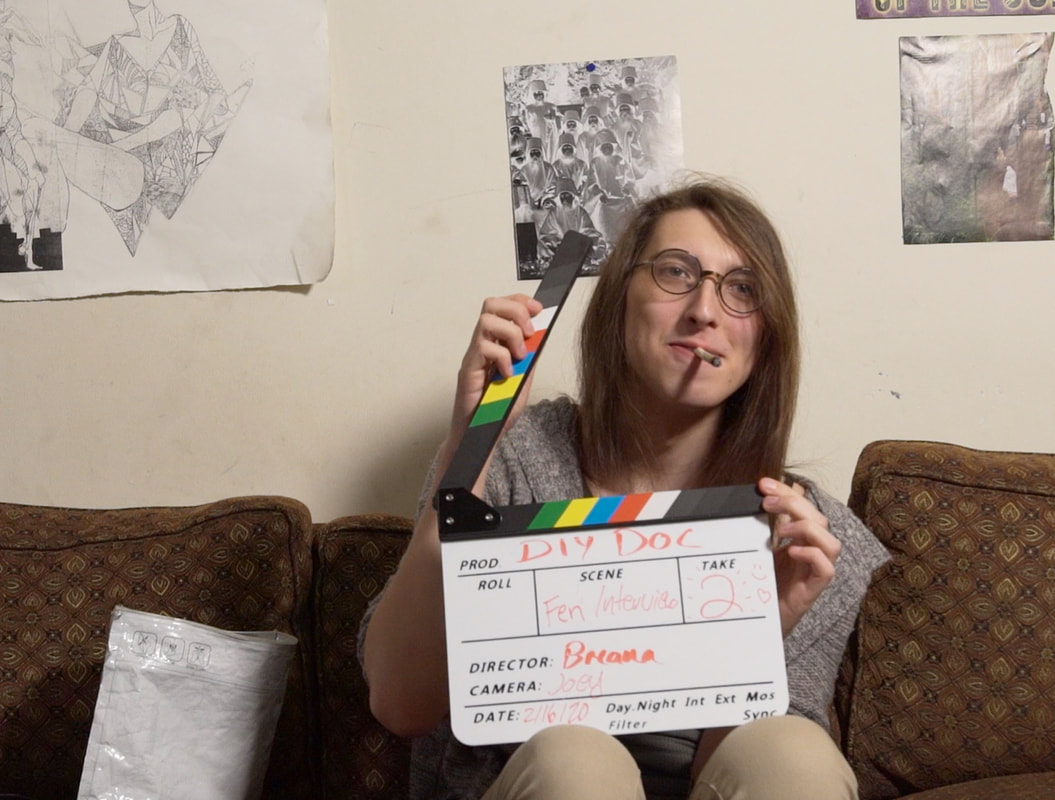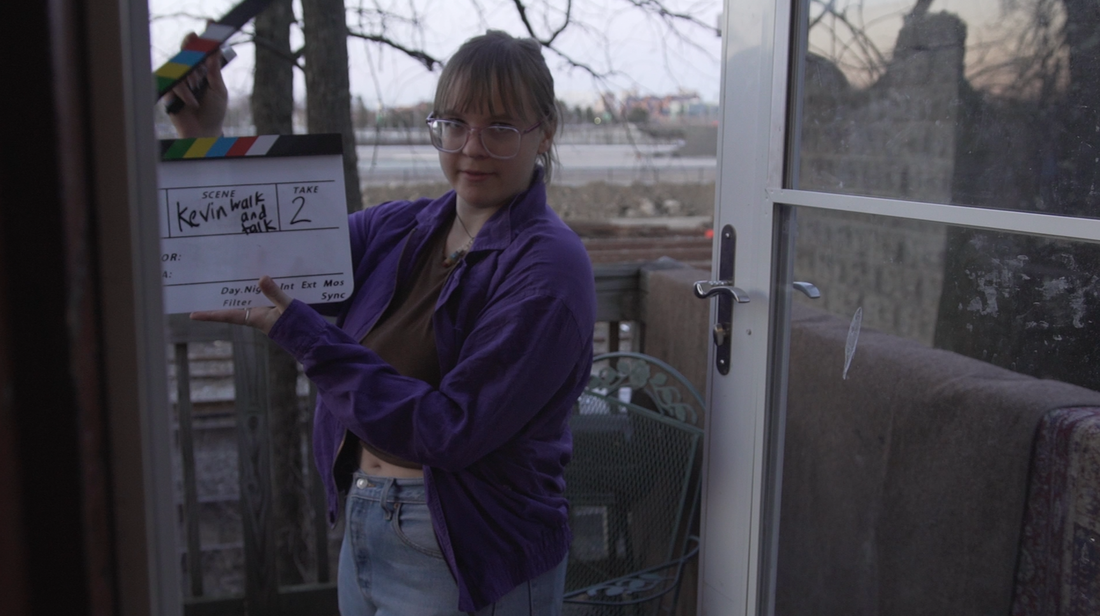|
DIY DOC : Trendy Shit Town
DIY Doc is an episodic documentary series exploring Boston's underground music scene. In each of the 4 different homes we visit, struggling DIY musicians invite you in for shows and interviews as they strive to play their music and pay their rent with the immense uptick of gentrification in Boston. "Trendy Shit Town" is the first house in the series. It focuses on trans musician Fen Rotstein, who lives at Trendy Shit Town and helps to book shows there. Breana Del Gatto Breana Del Gatto is a recent graduate from Emerson College in Boston, MA with a BA in film and video and a focus on documentary. She grew up with two feisty, New York Italian born and bred parents who moved to the CT suburbs when she was 9. Raised in a household surrounded by outspoken Italians with a sailor’s mouth, she didn’t have much hidden from her and has always been interested in people and things that go against the current. She is curious about the world around her, carrying one of her various film and video cameras with her whenever she leaves the house. She’s impulsively free-spirited by nature, and loves going to shows and movies alone, talking to strangers, and going on impromptu adventures. She is interested in using documentary to highlight the stories of the unique people she meets on her journeys, with a heavy creative focus on D.I.Y and low budget production and style. Instagram: @diy_doc @uncannyvall3ygirl
1. Initiation and concept: How did you begin this series? What brought you to tell this story? How did you develop the concept?
As a senior at Emerson, I got into the BA Capstone program, and had an opportunity to be in a semester-long class surrounded by other filmmakers, a knowledgeable professor, and priority access to our school’s professional camera equipment. I was fairly new to Boston ,as I had just transferred from school in New York City. I knew I wanted to do a documentary of some sort, but was struggling with what. So much about Boston was still unfamiliar to me, but one concept wasn't, D.I.Y. As an adolescent in the suburbs, I grew up listening to underground music, and always longed to explore D.I.Y scenes. However, the access was limited. If you didn’t have friends that liked going to shows, you hardly knew anyone who even went to shows, and you didn’t know any musicians, how the hell were you going to find out where the shows were, when D.I.Y music was all about privacy and secrecy? That’s why when I finally got to NYC, I went to as many shows I could find, even with my limited access. Coming to Boston 2 years later, I was especially unfamiliar with basement venues there. Funny enough, I got added to Boston’s D.I.Y facebook group by a boy I met on tinder (that I never actually met, but hey, thanks dude!), and my Boston music world opened. I knew I wanted to do my documentary on Boston’s scene, as D.I.Y had been an inspiration for me growing up and I wanted to be able to use my privilege as a film student and access to equipment and an audience to highlight the work being done to keep the scene alive. I had about 5 months to hand in a finished product to my professor, though I knew I’d be working on the project beyond the Capstone deadlines. I spent about the first month of production just doing research. I met up with everyone and anyone I got in contact with involved in the D.I.Y scene to give me insight and point me in the right direction. I filled up notebooks with transcriptions of our conversations, bands to reach out to, show bookers to contact, and houses to check out. Those amazing people who responded to my first post in the Boston D.I.Y facebook group and sat with me while I picked their brain helped me gain the basic foundation for the story I was trying to tell, and this film literally would not have happened without them.
2. Production : Can you tell us about how you managed a documentary crew? Were you connected to the subjects? How long was production?
This was my first time managing a documentary crew, and it was an amazing experience. I always gravitated towards documentaries because you can make great work with a small team, and you can really hand pick that team to make it full of people you trust, and genuinely enjoy working with. I never felt like I wanted someone on a crew just to fill a spot. Documentary gives you the ability to be D.I.Y, work with limited equipment, and crew and still tell an amazing story. We had SO much fun, especially during filming. It was hard not to, as all the subjects were open, hilarious, and usually smoking or passing around communal beers. Not to mention, every time we shot at a house, we made sure to shoot during the day when a show was scheduled for that night. So as a crew, we also got to enjoy the party and music that began when the show started. It was definitely nice to be able to share a beer with your subjects after a long day of filming. We all felt very connected with our subjects. They were so expressive, passionate and free spirited, and we were all so genuinely fascinated with everything they had to say. Even more now in post, I’m stunned at their creativity, insight and knowledge of the music world, the scene, and commitment to what really matters when it comes to making true art. If COVID hadn't kicked us out (of school, and effectively Boston), I would have taken the opportunity to come back for more follow up interviews, and to genuinely just hang out. I truly felt like I made new friends throughout this filming process. The production spanned over 2 and a half months or so, before COVID finally kicked us all out of campus, shut down productions, and stopped all D.I.Y venues from operating, perhaps one of the saddest parts since most of the people in these houses can only pay their rents due to show revenue.
3. The Series: This short was an examination of one house venue . I’m very interested to see how others venues were. Were you able to document other spaces? How were they different?
I documented a total of 4 spaces during my time there. Episode 2, which I’m working on right now, explores “The Farm/Last House”, run by a 27 year old, slightly nihilistic, but loveable writer, with a disdain for college kids, who books shows at the legendary Allston showhouse. The next house is “1881”, very much a party house and one super friendly towards college kids. We actually interviewed them the day a huge show was shut down due to Covid, which became one of the first house shows cancelled due to climbing Covid tension. Finally, we documented a house of older punks in the scene, people ranging from their 30s to 40s, who all live together. They grew up in the Boston scene, are still a part of it, and still make music in it. Their insight was incredible and being some of the scene’s veterans, they provided us with so much unique information.
4, Influences: What are your documentary influences and how are you inspired by them?
I’m inspired by low budget, stylized, music heavy documentaries. Music is so important to me and while I am interested in exploring direct cinema, I feel my personal style is better suited to musically charged, D.I.Y, creative hand-heavy content. I enjoy low budget docs like “The Wild Wonderful Whites of West Virginia”, which is made up of a bunch of funny, dark, and wild characters backed by a soundtrack from Hank Wiliams 3. While funny and comedically stylized, it remains eye opening, touching, and troubling. Another favorite is Crime Scene Cleaners Inc, by D.I.Y outcast documentarian David J Sperling. It follows around a narcissistic, sarcastic “asshole” who cleans crime scenes for a living. Funny, disturbing, and weird as hell, it was made on a budget of $500. My absolute favorite documentary at the moment is Terry Zwigoff’s “Crumb”, and is definitely what inspires me most. The film took 9 years and left Zwigoff almost broke. It explores controversial artist R.Crumb and his troubled brothers, and is backed by a soundtrack from R. Crumb’s own band, “R. Crumb and His Cheap Suit Serenaders”. It’s humorous, beautiful, engaging, and somehow, one of the most disturbing documentaries I’ve ever watched. 5. Future: What are you working on next? Are you continuing with the series? I’m continuing the series. D.I.Y DOC has projected 4 more episodes: 3 on houses, and a set of mini docs (or one big one) exploring various college bands we got a chance to interview. I’m almost done with episode 2, on show house “Last House” and resident Kevin Fanning, and am set to release it March 18th! |
Tips and Picks from our collective members and featured artists!
Hand-picked short films and interviews with filmmakers. Free streaming (for a limited time) and 5 questions answered by the filmmakers. Contributers
All
|



